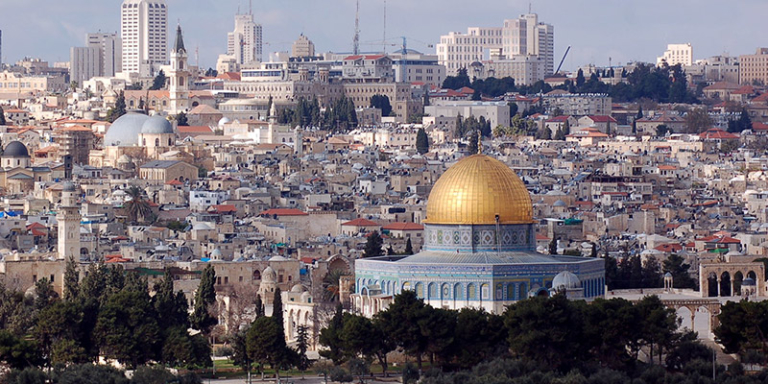
On March 22nd, The New York Times published an article by its Jerusalem correspondent Isabel Kershner titled “Tensions With Arab Allies Undermine a Netanyahu Pitch to Israeli Voters.” In it, Kershner focused on the reasons for cancelling Israeli Prime Minister Benjamin Netanyahu’s highly touted visit to the United Arab Emirates scheduled two weeks earlier. He was to meet with Emirati leaders to boost his diplomatic credentials among Israeli voters amid a raucous election campaign by highlighting, to critics and supporters alike, his personal role in advancing Israel’s interests in the Arab world and finalizing arrangements for a whopping $10 billion fund set up by the UAE for the purpose of investment in various strategic economic sectors in Israel.
Kershner noted that cancelling the visit to Abu Dhabi, the UAE capital, was due to the Emiratis’ public refusal, as articulated by UAE presidential advisor Anwar Gargash, to be used to boost Netanyahu’s chances in Israel’s charged parliamentary election on March 23rd. According to the article, what complicated the matter was Jordan’s refusal on March 10th to grant overflight permission to a private jet to fly Netanyahu to Abu Dhabi, where he was to meet with Abu Dhabi Crown Prince Mohammed bin Zayed. That meeting was to prepare for the so-called “Abraham Accords summit meeting,” scheduled this April with the participation of Arab countries that recently normalized relations with Israel, namely the UAE, Bahrain, Morocco, and Sudan, in addition to the Biden Administration. The diplomatic spat with Jordan was supposedly precipitated by disagreements over logistics and security arrangements for a visit by Jordanian Crown Prince Hussein bin Abdullah to the Haram al-Sharif in Jerusalem, where the Hashemite Kingdom has been historically responsible for Muslim and Christian holy sites. The crown prince eventually cancelled his trip.
Rich as it is with details of Netanyahu’s use of foreign relations to advance his electoral prospects, the article may have missed important––indeed, essential––elements of Arab and Israeli political differences and strategic considerations. These could better explain both Jordan’s refusal to grant the Israeli premier overflight privileges and the Emirates’ decision to scuttle Netanyahu’s much-ballyhooed public visit to Abu Dhabi, the first Arab capital to sign a normalization deal with Israel in a generation.
To be sure, it is hard to believe that a visit by Jordan’s crown prince to holy sites essential for his family’s legitimacy can just be cancelled over disagreements pertaining to the size of his security detail and other logistical matters. After all, there have been myriad other visits by Jordanian officials to Jerusalem before, without such complications or disagreements. This time around, however, Jordan must have realized that Israel plans to use the crown prince’s visit to essentially undermine the historic pre-1967 “Status Quo” arrangements in Jerusalem, including the Hashemite Kingdom’s vaunted privilege as custodian of Muslim and Christian religious sites in the city. Had the crown prince or his father, King Abdullah II, accepted the Israeli conditions for the impending visit to Jerusalem, they would have tacitly acceded sovereignty over the city to Israel. In essence, Israel would have become a “host” for the crown prince and would have gained a public acknowledgement that it has complete sovereignty over the city and its holy places—something truly tragic and consequential for the Hashemites, indeed for all self-respecting Muslims worldwide, particularly amid a hotly contested Israeli parliamentary election campaign.
Frankly, this incident is not the first or the last such encounter between Amman and Tel Aviv over control of Jerusalem. According to Jordanian sources familiar with the issue, Israel has persistently attempted to use loopholes in the Jordanian-Israeli peace treaty of 1994 to control access to the Haram al-Sharif (the Al-Aqsa Mosque and Dome of the Rock), limit the number of worshipers who could pray there on Fridays or religious holidays, or perform dangerous excavations under the complex. These excavations are preludes to what many Israeli religious zealots would like to accomplish: cause the collapse of the Haram al-Sharif so that they can rebuild Solomon’s Temple on the same site. Every time Israel violated understandings about the religious sites, Jordan was quick to object and use its direct, indirect, and diplomatic channels to make its displeasure known, thus temporarily softening or delaying Israeli practices.
In this last diplomatic clash, however, Netanyahu tried to cater to the same religious extremists in Israeli society and in the illegal settlements on the occupied West Bank to gain their vote on March 23rd. It was another attempt at manipulating historical agreements and foreign policy to serve personal electoral aims. But what is almost as important is the reality that Israel’s behavior regarding holy sites in Jerusalem is wittingly or unwittingly helped by Jordan’s neglect to address whatever ambiguities that exist in the 1994 treaty. These will, most assuredly, be used on other occasions in the future for the same outcome: tacit but public recognition of Israel’s sovereignty over Jerusalem and its holy places of worship.
Concomitantly, it is not hard to see that the Israeli ruse in Jerusalem, had it worked, would have helped Emirati and other Arab leaders justify their normalization agreements with Israel in the context of the “Abraham Accords,” a sacrilegious concept concocted in coordination with Netanyahu by Jared Kushner and David M. Friedman of the Trump Administration, aimed at manipulating religious affiliation for obscene political ends. In the beginning, Emirati leaders said that having diplomatic relations with Israel would not come at the Palestinians’ expense or at the cost of ceding final status issues, such as the fate of Jerusalem. Had Jordan’s crown prince come to Jerusalem under Israel’s security protection and according to agreed-upon arrangements with the Israeli authorities, the UAE, Bahrain, Sudan, and Morocco––indeed, the whole Muslim world––would have been absolved of insisting on protecting Jerusalem’s identity as home to Islam’s third holiest shrine. By the same token, if Jerusalem were to stop being a contentious issue, Saudi Arabia would feel less constrained, domestically or regionally, to have its own normalization deal with Israel, thus further undermining Palestinian, Arab, and Muslim rights in the city.
As things stand today, Jordan’s Hashemites dodged a bullet that would have damaged their own legitimacy because they were alerted at the last minute to the possibility of publicly legitimating Israeli sovereignty over Jerusalem. The hope is that the Jordanian government can be more vigilant and assertive about dealing with Netanyahu’s ruses, and those of his successors, that work only in Israel’s favor. As custodian of religious sites in the city, Jordan should continue to adhere to the pre-1967 “Status Quo” arrangements in the city and exercise its responsibility to protect international law and the interest of worshipers and visitors from around the world. More importantly, the same applies to US governments which have historically endorsed these arrangements until the Trump Administration violated their original intent for its own narrow purposes.
On the other hand, Arab governments that normalized with Israel, especially the UAE which appears to be headlong into deep relations with the Zionist state, should reexamine their original rationales for normalization. With a new, but more extreme, Israeli right-wing government that will inevitably emerge following the March 2021 election, Arab normalizers are less likely to realize perceived benefits from open relations with Israel in the foreseeable future. Indeed, when it comes to the relentless clash between Palestinian rights and Israeli interests, there is hardly any difference, thus far, between the Trump Administration that secured the so-called “Abraham Accords” between Israel and four Arab capitals and the Biden Administration, which will most likely turn a blind eye to Israel’s protracted occupation and apartheid system imposed on millions of Palestinians in occupied Palestine.
Photo credit: Flickr/twiga_swala

